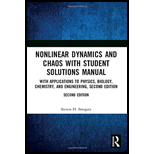
Interpretation:
To calculate
Concept Introduction:
The linearized system for
The matrix
Answer to Problem 11E
Solution:
The system in Cartesian coordinate is
The linearized system at the origin is
Explanation of Solution
Using the first equation
Integrating both sides,
When
Solve the stability of the origin by solving
Thus the origin is a stable point.
Solve the nature of the origin by solving
Thus the origin is spiral.
The system in
Comparing the above polar coordinates with the given coordinates,
Multiply equation 1) by x and equation 2) by y and subtract,
Multiply equation 1) by y and equation 2) by x and add,
The Jacobian matrix at any fixed point
Substituting values of
It is proved and origin is a stable star for the linearized system.
Integrating given polar equations we can find
Want to see more full solutions like this?
Chapter 6 Solutions
EBK NONLINEAR DYNAMICS AND CHAOS WITH S
- 5.8 A reinforced concrete column is 12 feet long, and un- der load, it shortens 3 inches". Determine its average unit strain. Average Unit Strainarrow_forward5.10 A 500-foot-long steel cable is loaded in tension and registers an average unit strain of 0.005. Determine the total elongation due to this load. Total Elongationarrow_forward5.14 A 100-foot-long surveyor's steel tape with a cross- sectional area of 0.006 square inch must be stretched with a pull of 16# when in use. If the modulus of elasticity of this steel is E = 30,000 ksi, (a) what is the total elongation 8 in the 100 foot tape and (b) what unit tensile stress is pro- duced by the pull? a. Elongation b. Tensile Stressarrow_forward
- Obtain the voltage across the capacitor for the following input: (a) 5Volts; (b) 3sin(t); (c) 2 cos(t). Use Laplace transform and Cramer's rule.arrow_forwardObtain the voltage across the capacitor for the following input: (a) 5Volts; (b) 3sin(t); (c) 2 cos(t). Use Laplace transform and Cramer's rule.arrow_forwardObtain the voltage across the capacitor for the following input: (a) 5Volts; (b) 3sin(t); (c) 2 cos(t). Use Laplace transform and Cramer's rule.arrow_forward
- v(t) + R₁ = 1 ohm W R2 = 1 ohm www i1(t) 0000 L = 2H i2(t) C 1F + vc(t)arrow_forwardObtain the voltage across the capacitor for the following input: (a) 5Volts; (b) 3sin(t); (c) 2 cos(t). Use Laplace transform and Cramer's rule.arrow_forwardFor communcation marks. In the questions answered above should have the criteria show proper mathematical form use proper symbols, notations, conventions, graph(s) where applicable solution is neat, clear and easy to follow If you write on the paper in online version you will be assigned 0 marks except graph.arrow_forward
- a) If is a polynomial function, does always have to have a horizontal asymptote? If no, provide a counterexample. ax+b b) Write an equation for a rational function whose graph of the formex+d where f(x) has all the indicated features. X-intercept of 14 Y-intercept of -1/2 VA with equation -2/3 HA with equation 4/3arrow_forwardAn airplane has a speed of 400 km/h with no wind. The airplane flies 2140 km with the wind. The airplane can only fly 1860 km against the wind in the same time. If w represents the speed of the wind, create an equation could be used to solve for w? Find the speed f the wind. hint; Use Time = Distance / speedarrow_forwardx²+8x+15 f(x) = Consider the function. x²-x-12 a) Determine the following key features of the function: i) domain and range ii) intercepts iii) equations of any asymptotes and holes iv) intervals where the function is increasing and intervals where the function is decreasing v) Sketch the graph.arrow_forward
- Algebra & Trigonometry with Analytic GeometryAlgebraISBN:9781133382119Author:SwokowskiPublisher:Cengage
